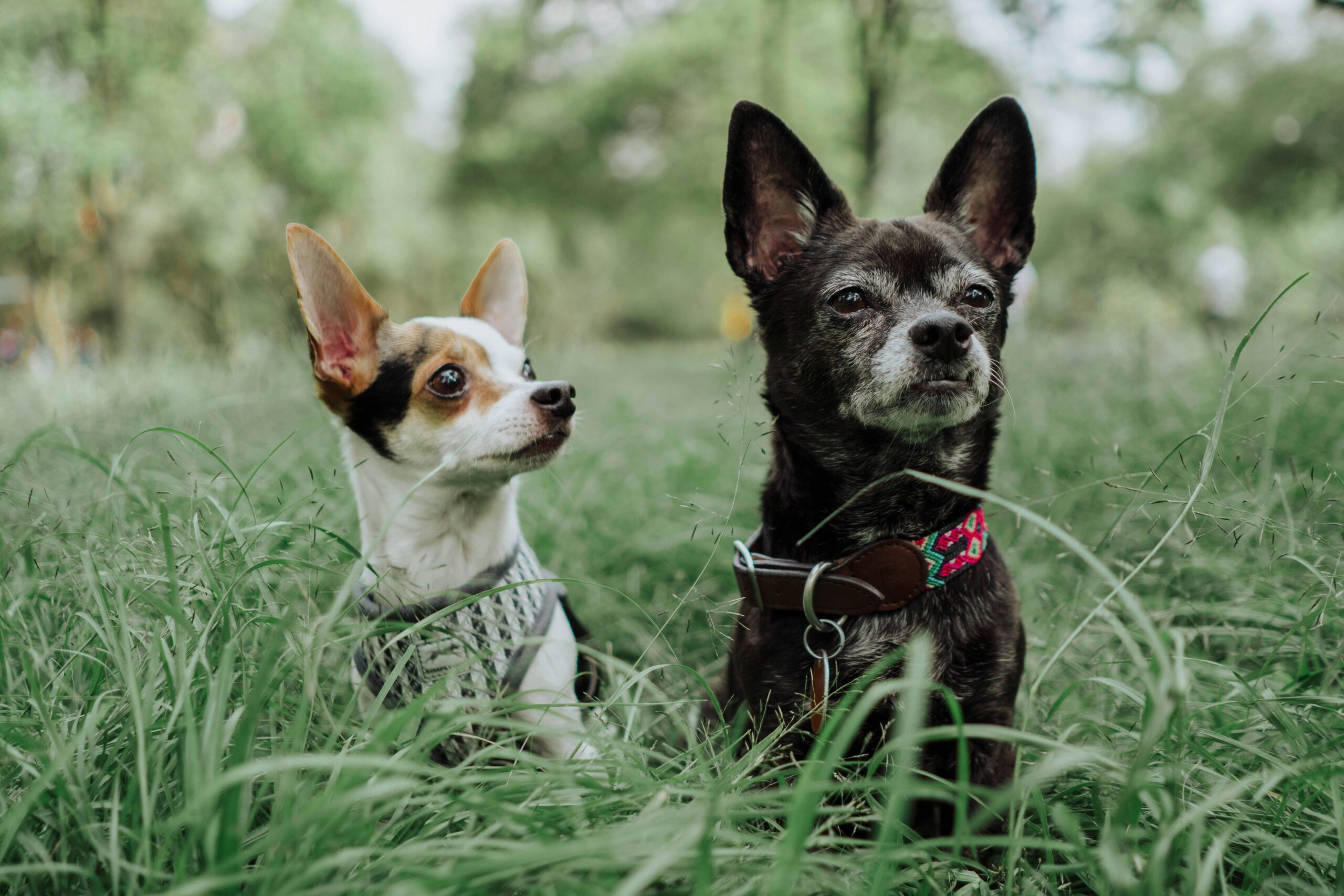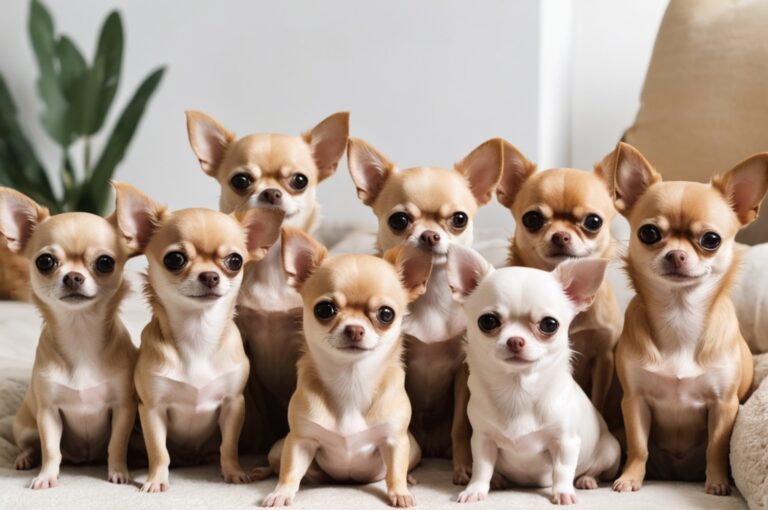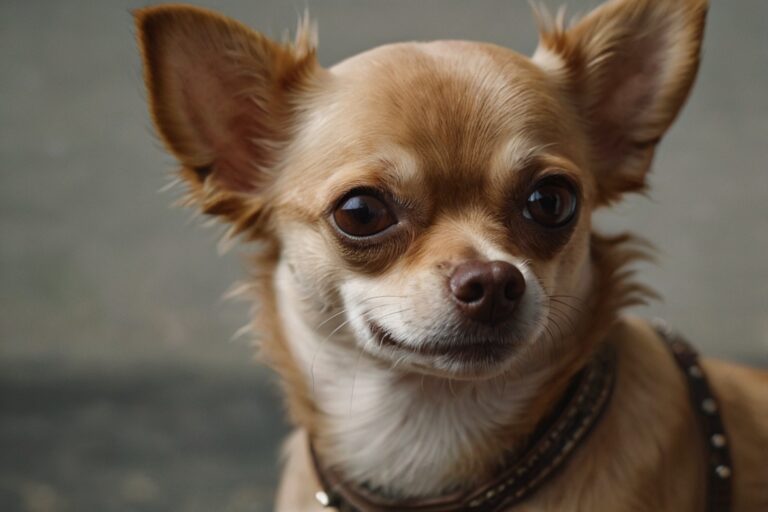How to Start a Chihuahua Breeding Program from Scratch

Starting a Chihuahua breeding program is a rewarding but complex endeavor. It’s essential to be prepared for the challenges and responsibilities that come with breeding dogs, especially a small, delicate breed like Chihuahuas. This article will guide you through the process, covering the fundamental aspects you need to know to build a successful breeding program from scratch.
1. Understanding Chihuahua Breeding Basics
Before diving into the specifics of breeding Chihuahuas, it’s crucial to understand the overall landscape of dog breeding. This means grasping what it entails, the commitment it requires, and the ethical standards you must uphold. When done right, breeding can contribute positively to the Chihuahua breed, ensuring healthier, well-tempered puppies that fit the breed standard. However, irresponsible breeding can lead to health complications, behavioral issues, and contribute to overpopulation, making it vital to approach this venture with care.
1.1 What Does Breeding Chihuahuas Involve?
Breeding Chihuahuas involves more than just pairing two dogs and selling the puppies. First, you need a solid understanding of the breed’s genetic health, temperament, and breed standards. You’ll also need to invest in high-quality care for both the dam (female) and sire (male). Chihuahua breeding demands time, patience, and significant financial resources to ensure the well-being of the dogs and the success of the breeding program.
For example, Chihuahua litters are often small, with typically only one to three puppies per litter, which means your income per litter may be lower than larger breeds. However, due to their popularity, Chihuahuas still command a strong market, making them an excellent breed for a breeding program if done responsibly. Ensuring your dogs meet breed standards, including their temperament, size, and coat type, will help maintain a reputable breeding program.
1.2 Why Choose Chihuahuas for Breeding?
Chihuahuas are one of the most popular dog breeds in the world due to their small size, big personalities, and suitability for apartment living. This high demand makes them an appealing option for breeders. However, breeding Chihuahuas comes with unique challenges due to their small size and sometimes delicate health, which must be carefully monitored. Understanding the breed’s quirks, such as their propensity for specific genetic conditions like heart murmurs and patellar luxation, is key to ensuring the health of both the breeding pair and the resulting puppies.
Chihuahuas are ideal for breeders who are passionate about the breed and willing to take the time to study their genetics and traits. A deep understanding of the breed will help you breed puppies that meet the American Kennel Club (AKC) standards for temperament and physical traits, such as their apple-shaped heads and compact bodies.
1.3 The Importance of Breeding Ethics
Ethical breeding is at the heart of every successful breeding program. This means breeding for the health and well-being of the dogs rather than purely for profit. As a breeder, you are responsible for the lives and health of not only your breeding dogs but also their puppies. This includes ensuring that your dogs are in excellent health before breeding and that they are free of genetic defects that could be passed down to future litters.
Ethical breeders are also concerned with finding good homes for their puppies, ensuring that they are not sold to puppy mills or buyers who are unprepared for the responsibility of pet ownership. Upholding high ethical standards will protect your breeding reputation and the well-being of the dogs.
1.4 Chihuahua Breed Standards to Consider
When breeding Chihuahuas, it is essential to adhere to the breed standards set by organizations like the AKC. These standards cover the size, shape, and temperament of the dogs and ensure that your breeding program is producing quality, healthy dogs that embody the best of the Chihuahua breed.
For example, Chihuahuas are known for their distinctive apple-shaped heads, large, alert eyes, and compact, muscular bodies. They come in two coat types—smooth and long-haired—and each coat type has its own grooming and care requirements that must be taken into consideration during breeding. Adhering to these standards will make your puppies more desirable to buyers and contribute to the overall improvement of the breed.
2. Setting Up Your Breeding Program

Now that you understand the basics of Chihuahua breeding, it’s time to set up your breeding program. This step involves more than just acquiring breeding dogs; it’s about creating a structured and professional approach to breeding. From registering your kennel name to setting up proper facilities and care routines, this section will guide you through the essential steps.
2.1 Registering Your Kennel Name
One of the first steps in starting a breeding program is registering your kennel name with a recognized dog breeding organization, such as the American Kennel Club (AKC). A kennel name is essentially the “brand” of your breeding program, and registering it is important for establishing a reputation within the dog breeding community. The kennel name appears in the registered names of the puppies you breed, marking them as part of your breeding lineage.
To register a kennel name, you’ll need to meet specific requirements set by the breeding organization, such as showing that you’re committed to ethical breeding practices. Having a registered kennel name not only adds credibility but also allows you to promote your breeding program under a recognized name. It’s an essential part of marketing and maintaining your brand in the dog breeding world.
2.2 Creating a Business Plan for Your Breeding Program
While breeding Chihuahuas can be a passion, it’s also a business that requires a well-thought-out plan. Your business plan should cover the financial aspects of breeding, including the cost of purchasing breeding dogs, health care, food, housing, and marketing. It should also outline your long-term goals, such as how many litters you plan to produce each year and the types of homes you want to find for your puppies.
A solid business plan will help you stay organized and ensure that your breeding program is financially viable. It’s also crucial for securing any necessary permits or financing if you plan to scale up your breeding program in the future.
2.3 Setting Up Your Breeding Space
Your breeding facility should provide a safe, clean, and comfortable environment for both the breeding dogs and their puppies. This includes having designated areas for whelping (giving birth), nursing puppies, and caring for the mother during her pregnancy. Chihuahuas are small dogs, so they don’t require a large amount of space, but they do need a safe, temperature-controlled environment where they can be monitored easily.
Investing in high-quality whelping boxes, comfortable bedding, and sanitary supplies will make the breeding process smoother. Ensuring that your breeding area is kept clean and free from stressors, such as loud noises or disruptions, is essential for the health of the mother and puppies.
2.4 Acquiring Quality Breeding Dogs
The success of your breeding program starts with the quality of your breeding dogs. You’ll want to acquire Chihuahuas that meet breed standards, have good temperaments, and are free from genetic health issues. Look for dogs with a solid pedigree, as this will improve the quality of your litters.
Working with reputable breeders or Chihuahua clubs is the best way to find quality dogs. You may also consider attending dog shows to see potential breeding dogs in person. Building relationships with other breeders can also provide valuable insights and connections in the Chihuahua breeding community.
3. Legal and Ethical Considerations in Chihuahua Breeding
Before starting any breeding program, it’s important to understand the legal and ethical responsibilities that come with breeding dogs. Chihuahua breeding is regulated by various laws and guidelines depending on your location, and staying informed on these requirements is essential for maintaining a reputable and legal operation.
3.1 Understanding Local Breeding Laws
In most countries or regions, dog breeding is subject to legal regulations to ensure that breeders are operating responsibly. These laws often cover aspects such as the number of dogs you can own, the conditions in which they are kept, and the care they receive. Depending on where you live, you may also need specific licenses or permits to breed and sell dogs. Some areas have strict guidelines to prevent overbreeding and the mistreatment of animals, so it’s critical to research and comply with your local breeding laws.
Many places also require regular inspections of breeding facilities, so maintaining a clean and healthy environment for your dogs is not just important for their well-being but also for meeting legal standards. Failing to adhere to local laws can lead to fines, your breeding program being shut down, or even criminal charges.
3.2 Ensuring Ethical Breeding Practices
Ethical breeding goes hand in hand with legality, and it’s vital to prioritize the health and well-being of your Chihuahuas. Responsible breeders avoid practices that are harmful to the dogs or that focus solely on profit. For instance, overbreeding can lead to health problems for both the dam and the puppies, and producing litters solely for their color or appearance can result in genetic defects.
Ethical breeders conduct thorough health screenings on both the male and female Chihuahuas before mating to ensure they are free from hereditary health issues. They also limit the number of litters a female Chihuahua can have in her lifetime to avoid strain on her body. By following ethical breeding practices, you contribute to improving the Chihuahua breed and ensure your breeding program is respected by buyers and fellow breeders alike.
3.3 Avoiding Inbreeding and Genetic Problems
Inbreeding, or breeding closely related dogs, can lead to a variety of genetic health issues in Chihuahuas. While it might seem tempting to breed dogs with certain desirable traits, doing so without proper genetic diversity can cause inherited health problems like heart issues, epilepsy, or patellar luxation (dislocated kneecap).
To avoid these issues, it’s essential to study the bloodlines of your breeding Chihuahuas. Make sure they are not too closely related and always aim for healthy genetic diversity in your breeding program. Genetic testing is also available to help identify potential carriers of hereditary diseases, enabling you to make informed breeding decisions.
3.4 Registering Your Chihuahua Litters
Once your Chihuahua puppies are born, registering them with recognized organizations like the AKC is an important step. Registration gives your puppies legitimacy and credibility, making them more desirable to potential buyers. It also ensures that their lineage is officially recorded, which is important for maintaining breed standards.
To register your Chihuahua puppies, you’ll need to fill out specific paperwork provided by the organization. This includes information about the puppies’ parents, health certifications, and sometimes even their microchip details. Registering your litters not only boosts your reputation but also helps track the health and lineage of future generations of Chihuahuas.
4. Ensuring the Health of Your Breeding Dogs

Maintaining the health of your breeding dogs is a key component of a successful Chihuahua breeding program. Healthy dogs produce healthier litters, which means fewer complications during pregnancy and birth, as well as more robust puppies. Regular vet check-ups, proper nutrition, and a clean environment are all essential elements in keeping your Chihuahuas in prime condition for breeding.
4.1 Regular Veterinary Care for Breeding Chihuahuas
Regular veterinary care is essential to monitor the health of your breeding Chihuahuas. Before beginning a breeding program, you should schedule thorough health check-ups for both the male and female dogs to ensure they are fit for breeding. This includes routine tests for common Chihuahua health issues such as heart murmurs, eye conditions, and joint problems like patellar luxation.
Once breeding begins, it’s critical to continue regular vet visits throughout the pregnancy to monitor the health of the dam and the developing puppies. This helps catch any potential complications early, ensuring a safer pregnancy and delivery.
4.2 Proper Nutrition for Breeding Chihuahuas
Feeding your breeding dogs a high-quality, well-balanced diet is crucial for their health and fertility. Nutritional needs change during different life stages, and breeding dogs may require additional supplements to support fertility, pregnancy, and lactation.
For pregnant Chihuahuas, it’s important to provide food that supports the increased energy demands of pregnancy and nursing. High-protein diets and specialized prenatal supplements can help improve fertility rates and ensure healthy development for the puppies. Consult your vet to choose the best diet plan for your breeding Chihuahuas and monitor their weight to avoid obesity, which can complicate pregnancy.
4.3 Exercise and Mental Stimulation for Breeding Dogs
Keeping your breeding Chihuahuas active and mentally stimulated is equally important. Regular exercise helps maintain their weight, reduces stress, and promotes overall well-being. Chihuahuas are small dogs, so they don’t need intense exercise, but daily walks and playtime are essential to keep them healthy.
Mental stimulation is also crucial, as boredom can lead to behavioral problems, especially in intelligent breeds like Chihuahuas. Providing toys, interactive games, and occasional training sessions helps keep their minds sharp and reduces stress, which can also impact fertility.
4.4 Preventing and Managing Common Health Issues in Chihuahuas
Chihuahuas are prone to certain hereditary health issues, so it’s important to be proactive in preventing and managing these conditions in your breeding program. Common health concerns in Chihuahuas include heart disease, hydrocephalus (fluid on the brain), and dental problems.
To minimize these risks, regular health screenings and early detection are critical. Genetic testing can help identify carriers of hereditary diseases, while regular dental check-ups will help prevent dental issues that can worsen with age. Taking these preventive measures will improve the overall health of your breeding stock and their puppies, leading to a more successful and ethical breeding program.
5. Selecting the Right Breeding Pair

Choosing the right breeding pair is one of the most important decisions you’ll make in your Chihuahua breeding program. The dogs you select will determine the health, temperament, and appearance of the puppies, so it’s crucial to make informed choices. Factors like genetics, temperament, and physical traits should all be carefully considered to ensure the best possible outcomes for your breeding efforts.
5.1 Evaluating Genetics and Health History
The genetic makeup of your breeding dogs plays a significant role in the health and quality of the puppies. It’s essential to evaluate the health history of both the sire (male) and dam (female) to minimize the risk of passing on genetic disorders. Chihuahuas, like other breeds, are prone to specific health issues, such as patellar luxation, heart problems, and hydrocephalus, which can be hereditary. Before selecting a breeding pair, consider getting them genetically tested for common Chihuahua health conditions. This testing will give you a clear picture of any potential health risks and help you make informed breeding decisions.
In addition to health screenings, check the family tree or pedigree of the dogs to avoid inbreeding. Inbreeding can lead to a host of genetic issues, so aim to breed dogs that are not closely related and have a history of good health in their bloodline.
5.2 Assessing Temperament for Breeding
Temperament is another critical factor when selecting a breeding pair. Chihuahuas are known for their bold personalities, but they can also be prone to being nervous or aggressive if not properly socialized. Breeding dogs with stable, calm, and friendly temperaments will help produce puppies that are well-suited for family life and easier to train.
Spend time observing the behavior of both the male and female dogs before deciding to breed them. Are they friendly with people and other animals? Do they exhibit anxious or aggressive tendencies? Puppies often inherit the temperament of their parents, so selecting dogs with good dispositions will contribute to producing well-balanced puppies.
5.3 Physical Traits and Breed Standards
When selecting a breeding pair, it’s essential to consider physical traits and how they align with the breed standards for Chihuahuas. According to organizations like the American Kennel Club (AKC), Chihuahuas should have specific physical attributes, including their apple-shaped head, large round eyes, and compact body structure.
Your breeding dogs should embody these characteristics to produce puppies that meet the breed standards. Additionally, coat type is another factor to consider. Chihuahuas come in two coat types: smooth and long-haired. If you are looking to produce puppies with a specific coat type, you’ll need to select breeding dogs that carry the appropriate genes.
5.4 Finding the Right Mate for Your Chihuahua
Once you have evaluated your female Chihuahua, the next step is finding a suitable mate. If you don’t own the male dog, you can partner with another breeder who has a stud (male Chihuahua) that meets your requirements. Many breeders list their studs for hire, so take the time to research and find a reputable breeder with a healthy, well-tempered Chihuahua.
When selecting a mate, ensure the stud is compatible with your female dog in terms of size, health, and temperament. It’s also essential to review the male’s pedigree, health certifications, and any previous litters he has sired. Choosing the right male is just as important as the female, as both contribute equally to the genetic makeup of the puppies.
6. Preparing for Chihuahua Pregnancy and Whelping

Once you’ve selected the right breeding pair and the mating process is successful, it’s time to prepare for the pregnancy and eventual birth, or whelping, of the puppies. Proper care during this period is crucial to ensure a smooth pregnancy and healthy puppies. Chihuahua pregnancies typically last about 63 days, so you’ll have plenty of time to get everything in order before the puppies arrive.
6.1 Signs of Pregnancy in Chihuahuas
Recognizing the signs of pregnancy in your Chihuahua is the first step in preparing for whelping. Some early signs to look for include changes in appetite, a slight increase in weight, and more affectionate or clingy behavior. In the later stages of pregnancy, your Chihuahua’s belly will become noticeably rounder, and you may even be able to feel the puppies moving.
It’s important to confirm the pregnancy through a veterinary exam, which may include an ultrasound or blood test. A vet visit will also give you an opportunity to discuss any concerns and ensure your dog is in good health throughout the pregnancy.
6.2 Creating a Comfortable Whelping Area
As your Chihuahua’s due date approaches, you’ll need to set up a whelping area where she can give birth comfortably. This area should be quiet, private, and free from any stressors that could affect the mother during labor. A whelping box, which can be purchased or homemade, is ideal for providing a safe and contained space for the birth.
Line the whelping box with soft bedding, such as towels or blankets, and make sure it’s easy to clean since things can get messy during the birthing process. Keep the area warm and ensure that the mother has access to food, water, and a comfortable place to rest.
6.3 Monitoring the Pregnancy
Throughout the pregnancy, it’s essential to monitor your Chihuahua’s health closely. Regular vet visits will help track the puppies’ development and ensure there are no complications. Your vet may recommend specific prenatal vitamins or dietary adjustments to support the pregnancy.
Keep an eye on your Chihuahua’s behavior, appetite, and energy levels. While it’s normal for pregnant dogs to become less active as the pregnancy progresses, sudden changes in behavior or appetite could be signs of a problem. Contact your vet if anything seems off or if you have any concerns about the pregnancy.
6.4 Assisting with Whelping
When the time comes for whelping, most Chihuahuas will be able to give birth without assistance. However, it’s important to be present in case complications arise. The first sign of labor is usually restlessness, panting, or nesting behavior, followed by contractions.
Puppies are typically born within a few hours, and each one will be delivered inside a fluid-filled sac. The mother will usually break the sac and clean the puppies herself, but if she doesn’t, you may need to step in and assist. Be sure to have your vet’s contact information on hand in case of any emergencies, such as prolonged labor or if the mother is struggling to deliver a puppy.
Final Thoughts
Starting a Chihuahua breeding program from scratch is a challenging but rewarding endeavor. It requires extensive knowledge, preparation, and a commitment to ethical breeding practices. From understanding the basics of Chihuahua breeding to selecting the right breeding pair and preparing for pregnancy, each step plays a crucial role in the success of your program.
The health and well-being of your dogs should always be the top priority. Breeding isn’t just about producing puppies; it’s about contributing to the longevity and quality of the Chihuahua breed. Ensuring that your dogs are healthy, happy, and well cared for will lead to better outcomes for both the puppies and the future of your breeding program.
By following proper procedures, staying informed on legal and ethical guidelines, and maintaining the highest standards of care, you’ll build a breeding program that not only produces beautiful, well-tempered Chihuahuas but also earns the respect and trust of fellow breeders and buyers alike. Remember, responsible breeding is a lifelong learning process, and being dedicated to continuous improvement will set you up for long-term success.
Podcast
Excited to dive into Chihuahua pregnancy care? Tune in to our latest podcast episode below or download the transcript for essential tips on supporting your pregnant Chihuahua!






